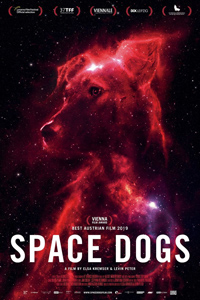Every Dog Will Have Her Day: Kremser & Peter Create a Canine Ghost Story in Moody Doc
 One mustn’t love dogs, per se, to enjoy the strangely hypnotic documentary Space Dogs from co-directing duo Elsa Kremser and Levin Peter, but it might dictate the film’s power to captivate and transfix. At the same time, one mustn’t need be entirely familiar with the point of entry, which is explained in a haunting omniscient narration the story of Laika, the Moscow born stray dog abandoned to the heavens and gain distinction as the first creature to orbit the Earth courtesy of a Soviet Space mission in 1957. Dead long before her body burnt up in her vessel’s reentry into the atmosphere, it’s widely believed her ghost haunts the city, examined through the ambling lives of her contemporary canine cohorts. Kremser and Peter connect a roughly hewn space traveling animal history with modern stray subjects, coalescing into a mood piece managing to be mix of effective estrangement and ingenious metaphor.
One mustn’t love dogs, per se, to enjoy the strangely hypnotic documentary Space Dogs from co-directing duo Elsa Kremser and Levin Peter, but it might dictate the film’s power to captivate and transfix. At the same time, one mustn’t need be entirely familiar with the point of entry, which is explained in a haunting omniscient narration the story of Laika, the Moscow born stray dog abandoned to the heavens and gain distinction as the first creature to orbit the Earth courtesy of a Soviet Space mission in 1957. Dead long before her body burnt up in her vessel’s reentry into the atmosphere, it’s widely believed her ghost haunts the city, examined through the ambling lives of her contemporary canine cohorts. Kremser and Peter connect a roughly hewn space traveling animal history with modern stray subjects, coalescing into a mood piece managing to be mix of effective estrangement and ingenious metaphor.
A Tarkovskyian version of Homeward Bound might look something like this ghost story of a dead canine in an expose which continues a trend of recapitulations designed to revisit mankind’s early space odysseys. With a memorable swagger which runs circles around the somnolence of Damien Chazelle’s emotionally paralyzed First Man (2018), Austria’s Elsa Kremser (making her debut) and Germany’s Levin Peter (whose last documentary Beyond the Snowstorm, 2016, explores the ghosts haunting the memories of his grandfather, a soldier stationed in the Ukraine with the Wehrmacht, Germany’s notorious Nazi armed forced) concoct something memorably idiosyncratic in their first pairing.
Laika might be a footnote in Western culture, though she represents a major turning point in the space fight between the US and the Soviet Union, and thus, is a much more important symbol for her native country. The sly comparison to ensuing space missions utilizing creatures, including the US response, which was the ascension of Ham the Chimp (launched in 1961), and the subplot about some unlucky turtles orbiting the moon, sets up another cultural juxtaposition.
Laika, snatched from the streets for a suicide mission, is exemplified as a brave creature fated to serve her country whereas Ham the Chimp was personified as a finicky subject, unable to be completely controlled and thus a detriment to the success of his mission. Thus, the metaphorical propaganda positions Laika and her ancestors as slavish servants of the state, prized for her unquestioning, unyielding sacrifice (and thus, a similar expectation for the Soviet people). Archival footage documenting ensuing puppy stunts, wherein dogs sent into space were bred to develop a brand of ‘space dogs,’ highlights the weird, resounding peculiarity of the cultural fascination and symbolic import of conquering space technology during the Cold War era.
Meanwhile, Kremser and Peter follow several canine subjects on the streets of Moscow, showcased as resourceful and regal survivors respected by their human neighbors. Sometimes, this descends into the brutality of the animal kingdom, such as two German Shepherds killing a cat. Often, these contemplative observances are underscored from some baleful soundtrack selections, which lends Space Dogs a surprisingly transcendent quality.
The opening narration from Alekey Serebryakov (of Andrey Zvyagintsev’s Leviathan, 2014) lends Laika’s narrative the solemn formality of a fairy tale prologue, but one which falls back to Earth with a brutality sometimes shocking but ultimately empathetic and always eloquent. A bizarre portrait of an era defining space race, the living remnants of mankind’s hubris remains his best friend—but only at convenience to his whims.
Reviewed on August 13th at the 2019 Locarno Film Festival – Competition Filmmakers of the Present. 91 Mins.
★★★½/☆☆☆☆☆


